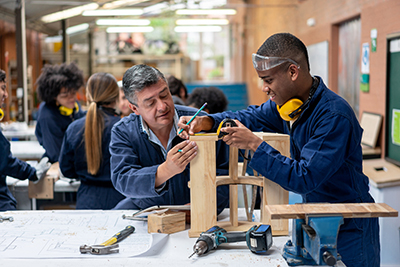Carpentry
The four-year Carpentry Apprenticeship is a high-quality program that meets the needs of the local construction industry, combines on-the-job training with classroom/lab instruction, and is accessible to students from diverse backgrounds, cultures and experiences. Graduates will be well-positioned to gain steady employment in the construction industry as a qualified journeyperson carpenter.

Program Goals and Objectives
The Carpentry Apprenticeship Program (CAP) at Roger Williams University (RWU) satisfies the State of Rhode Island requirements for hours, content, and assessment. All instructional spaces and practices are conducted in facilities and environments that are in compliance with current OSHA and RWU standards. We are the only higher education institution in the state offering a Carpentry Apprenticeship Program.
The RWU Carpentry Apprenticeship Program is unique and will assure the student is prepared for their next steps to enter the workforce at a higher level. As an additional bonus, students will earn college credits which can be used for further education at the Extension School through Prior Learning Assessment (PLA.)
Program Entry Requirements
The following requirements must be met before acceptance into the program
- Be at least 18 years old and legally authorized to work in the United States
- Have a High School Diploma, G.E.D., or High School equivalency Degree (H.S.E.D)
- Be able to pass a drug test.
- Meet the physical and performance demands of the job.
During your first year as a Carpentry Apprentice, you must complete
- First Aid/CPR (4 hours)
- OSHA Construction 30 Hour (30 hours)
OSHA 30 training approved and recommended sites
 Wage Scale
Wage Scale
- All working apprentices are eligible to be in paid apprenticeship placements, typically according to this wage-scale structure (estimated):
Year 1: 45% of journeyperson rate
Year 2: 60% of journeyperson rate
Year 3: 75% of journeyperson rate
Year 4: 90% of journeyperson rate
Course Outline
The goal is to prepare students in the program for working as a journeyperson carpenter and to align the curriculum with the challenges and activities typically associated with carpenter tasks on construction projects.
Classroom instruction will take place at the Providence and Bristol campuses and will be taught by experienced journeyman carpenters either working in the industry or recently retired with augmentation by some construction management program faculty in specific areas of expertise.
Program Details
Program Dates:
- Orientation - September 14, 2022
- Classes Being - September 21, 2022
- Program Completion - May 4, 2023
Classes meet:
Wednesdays & Thursdays
6-9 p.m.
Extension School / Providence Campus, 1 Empire Plaza, Providence RI 02903
Lab Class meets:
Saturdays
The School of Engineering, Computing and Construction Management (SECCM), Bristol Campus, 1 Old Ferry Road 02809
Explore the Bristol Campus Labs here!
Cost: $2020
This program combines on-the-job training with classroom/lab instruction.
Students must complete a total of 688 classroom instructional hours (164 hours per year)
Students must complete a minimum of 6,000 on the job working hours.
Upon successful completion of the RWU Carpentry Apprenticeship Program, a participant is eligible to have the coursework transcribed for 21 college credits. A successful participant must apply and be accepted to EXT as a matriculating student and successfully complete one semester prior to the credit being transcribed.
Carpenter Apprenticeship Program
First Year Curriculum
Fall 2022
Code | Competency | Hours | Date | Time | Location | Modality | Instructor | Notes |
1 | First Aid/CPR [1] | 4 | --- | --- | --- | --- | ||
1.1 | OSHA 30 hour [2] | 30 | --- | --- | --- | --- | ||
4.3 | Stair layout and construction | 8 | 9/24 | 8:00 a -4:30 p | Bristol | In-Person | Emmer | Classroom (SELB 304), lab safety, platforms |
4.3 | Stair layout and construction | 8 | 10/1 | 8:00 a -4:30 p | Bristol | In-Person | Emmer | Hands on lab |
7.3 | Welding | 8 | 11/12 | 8:00 a -4:30 p | Bristol | In-Person | TBD | Hands on lab |
8 | Drawings and Specifications | 3 | 9/21 | 6:00-9:00 pm | PVD | In-Person | Emmer | |
8 | Drawings and Specifications | 3 | 9/22 | 6:00-9:00 pm | PVD | In-Person | Emmer | |
8 | Drawings and Specifications | 3 | 10/5 | 6:00-9:00 pm | PVD | In-Person | Emmer | |
8 | Drawings and Specifications | 3 | 10/6 | 6:00-9:00 pm | PVD | In-Person | Emmer | |
8 | Drawings and Specifications | 3 | 10/19 | 6:00-9:00 pm | PVD | In-Person | Emmer | |
11 | Math for the Trades | 3 | 10/20 | 6:00-9:00 pm | Online | Online | Emmer | |
11 | Math for the Trades | 3 | 11/2 | 6:00-9:00 pm | Online | Online | Emmer | |
11 | Math for the Trades | 3 | 11/3 | 6:00-9:00 pm | Online | Online | Emmer | |
11 | Math for the Trades | 3 | 11/16 | 6:00-9:00 pm | Online | Online | Emmer | |
Total | 85 |
Spring 2023
Code | Competency | Hours | Date | Time | Location | Modality | Instructor | Notes |
8.4 | Green Building & Sustainable Construction | 3 | 2/22 | 6:00-9:00 pm | Online | Online | TBD | |
8.4 | Green Building & Sustainable Construction | 3 | 2/23 | 6:00-9:00 pm | Online | Online | TBD | |
8.4 | Green Building & Sustainable Construction | 2 | 3/1 | 6:00-8:00 pm | Online | Online | TBD | |
10.1 | Stepping up to be Foreman | 3 | 3/2 | 6:00-9:00 pm | PVD | In-Person | TBD | |
10.1 | Stepping up to be Foreman | 3 | 3/15 | 6:00-9:00 pm | PVD | In-Person | TBD | |
10.1 | Stepping up to be Foreman | 2 | 3/16 | 6:00-8:00 pm | PVD | In-Person | TBD | |
4.8 | Suspended Ceilings | 8 | 2/18 | 8:00 a -4:30 p | Bristol | In-Person | Emmer | Hands on lab |
5.1 | Fire stopping | 4 | 3/4 | 8:00a -12:00p | Bristol | In-Person | Emmer | Hands on lab |
6 | Light-gauge metal framing | 8 | 3/18 | 8:00 a -4:30 p | Bristol | In-Person | Emmer | Hands on lab |
6 | Light-gauge metal framing | 8 | 4/1 | 8:00 a -4:30 p | Bristol | In-Person | Emmer | Hands on lab |
6.1 | Drywall-Tape-Finish | 8 | 4/15 | 8:00 a -4:30 p | Bristol | In-Person | Emmer | Hands on lab |
8.1 | Building Information Modeling (BIM) | 3 | 3/29 | 6:00-9:00 pm | PVD | In-Person | TBD | |
8.1 | Building Information Modeling (BIM) | 3 | 3/30 | 6:00-9:00 pm | PVD | In-Person | TBD | |
8.1 | Building Information Modeling (BIM) | 3 | 4/12 | 6:00-9:00 pm | PVD | In-Person | TBD | |
8.1 | Building Information Modeling (BIM) | 3 | 4/13 | 6:00-9:00 pm | PVD | In-Person | TBD | |
8.1 | Building Information Modeling (BIM) | 3 | 4/26 | 6:00-9:00 pm | PVD | In-Person | TBD | |
9 | Construction Software and Technology | 3 | 4/27 | 6:00-9:00 pm | PVD | In-Person | TBD | |
9 | Construction Software and Technology | 3 | 5/4 | 6:00-9:00 pm | PVD | In-Person | TBD | |
9 | Construction Software and Technology | 2 | 5/5 | 6:00-8:00 pm | PVD | In-Person | TBD | |
11 | Math for the Trades | 4 | 4/29 | 8:00 a-12:00 p | Online | Online | Emmer | |
Total | 79 |
Total Year 1 164 hours
Orientation will be on Wednesday, September 14th from 6-8 p.m. in PVD
Code Competencies
1.0 First Aid/CPR (8 hours)
1.1 OSHA 30 Hour (30 hours)
2.0 Aerial Lift Training (8 hours)
2.1 Forklift Training (8 hours)
3.0 Rigging (8 hours)
3.1 Scaffolding and Staging Erection (12 hours)
3.2 Fall protection (8 hours)
4.0 Wood framing: floors and walls (40 hours)
4.1 Roof framing and trusses (40 hours)
4.2 Overhang-soffit framing (16 hours)
4.3 Stair layout and construction (16 hours)
4.4 Roof shingles and flashing (12 hours)
4.5 Exterior Finishes (16 hours)
4.6 Timber framing (32 hours)
4.7 Doors, frames, hardware, & windows (24 hours)
4.8 Suspended ceilings (8 hours)
4.9 Interior trim and millwork (24 hours)
5.0 Insulation (8 hours)
5.1 Fire-stopping (4 hours)
6.0 Light-gauge metal framing (16 hours)
6.1 Drywall-tape-finish (8 hours)
7.0 Concrete forming systems (40 hours)
7.1 Concrete mix design, testing, and placement (16 hours)
7.2 Concrete reinforcement (4 hours)
7.3 Welding (8 hours)
8.0 Drawings and specifications (16 hours)
8.1 Building Information Modeling (BIM) (26 hours)
8.2 Planning and scheduling (16 hours)
8.3 Contract documents & construction law (16 hours)
8.4 Green building and sustainable construction (8 hours)
8.4 Surveying and building layout (48 hours)
8.5 Productivity and cost management (16 hours)
8.6 Risk Management and problem solving (16 hours)
8.7 Communication-correspondence-documentation (16 hours)
9.0 Construction software and technology (24 hours)
10.0 Supervisor training (16 hours)
10.1 Stepping up to be foreman (32 hours)
11.0 Math for the trades (24 hours)
Total: 688 hours
Notes to Table
- Topics may be shifted between semesters based on the needs of the program

Competency Measurement/Program Assessment
The program will measure skills acquisition thru a combination of written and hands-on proficiency assessments. Data collected from the assessments will be utilized for overall program assessment and be plugged into the program quality improvement plan.
Probationary Period
The probationary period for all participants shall be one year from entry into the program. At the end of the probationary period, the Program Director, in consultation with the Apprenticeship Committee, will make a determination of ongoing participation and notify the participant in writing.
Instructor
 Dr. Michael Emmerreceived his B.S. in Construction Management, Suma Cum Laude, from Wentworth Institute of Technology in Boston in 2002, his M.S. in Construction Science and Management from Clemson University in South Carolina in 2004 and his Ph.D. from the University of Florida’s College of Design, Construction, and Planning in Gainesville in 2009. His areas of research and interest are sustainable construction with a focus in material extraction/reuse and deconstruction, estimating, and is also active in promoting and exploring owner training and productivity in the AEC industry. He has been teaching full-time for over ten years and before that worked in the construction industry for over 25 years in a variety of positions to include laborer, carpenter, carpenter foreman, superintendent, project manager, and owner’s representative.
Dr. Michael Emmerreceived his B.S. in Construction Management, Suma Cum Laude, from Wentworth Institute of Technology in Boston in 2002, his M.S. in Construction Science and Management from Clemson University in South Carolina in 2004 and his Ph.D. from the University of Florida’s College of Design, Construction, and Planning in Gainesville in 2009. His areas of research and interest are sustainable construction with a focus in material extraction/reuse and deconstruction, estimating, and is also active in promoting and exploring owner training and productivity in the AEC industry. He has been teaching full-time for over ten years and before that worked in the construction industry for over 25 years in a variety of positions to include laborer, carpenter, carpenter foreman, superintendent, project manager, and owner’s representative.
Dr. Emmer is a member of the American Council for Construction Education (ACCE) as a trustee, the American Society of Home Inspectors (ASHI), United States Green Building Council (USGBC), City of Attleboro Planning Board & Historical Commission, Association for the Advancement of Cost Engineering (AACE), and Housing Works of Rhode Island (HWRI) board of directors.
Questions? Reach out!
Everyone has questions.
Our Pathway Specialists are here to help. Contact EXT Admissions at ucadmissions@rwu.edu

